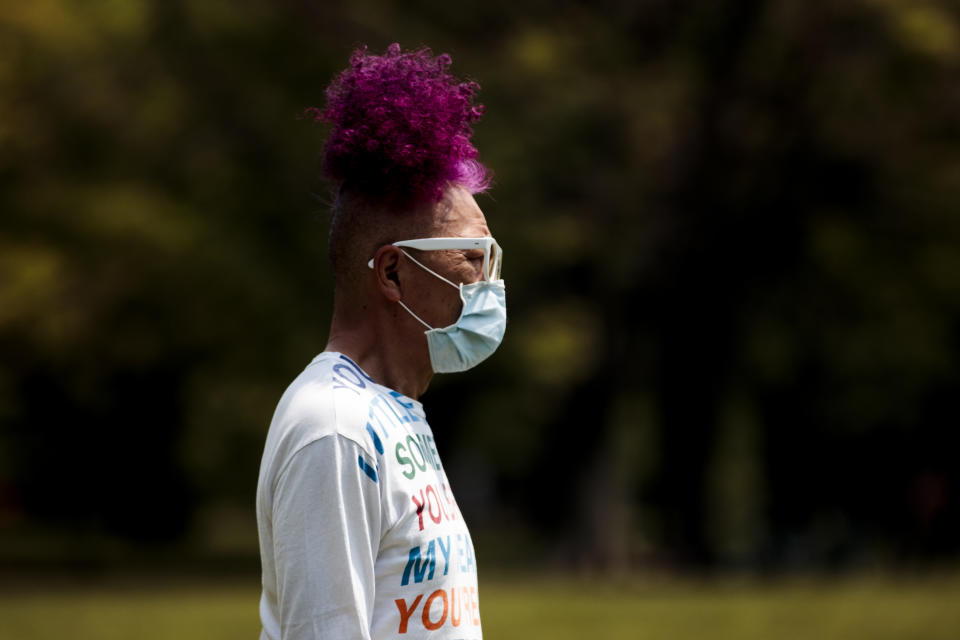Tom Hanks donates blood plasma after beating coronavirus, how could this help?

Tom Hanks and his wife Rita Wilson have donated their blood plasma after beating the coronavirus.
The Academy Award winning actor, 63, shared a picture of the donation with his 9.1 million Instagram followers.
Hanks and Wilson, who have been married 32 years, caught the infection while the Forrest Gump star was filming an Elvis Presley biopic in Australia in March.
With both making a full recovery, Hanks captioned the image: “Here’s last week’s bag of plasma. Such a bag! After the paperwork, it’s as easy as taking a nap.”
While the concept may sound far-fetched, transfusion treatments go back more than 100 years, with survivors of the Spanish flu pandemic of 1918/19 reportedly donating blood to patients.
Early research suggests the coronavirus is mild in four out of five cases, however, it can trigger a respiratory disease called COVID-19.
A post shared by Tom Hanks (@tomhanks) on
Coronavirus: How could plasma transfusions help?
Hanks and Wilson donated their plasma – the liquid part of blood – to scientists in California.
Similar trials are also underway in the UK. On 20 April, NHS Blood and Transplant asked people who have recovered from the coronavirus to donate blood for research.
Latest coronavirus news, updates and advice
Live: Follow all the latest updates from the UK and around the world
Fact-checker: The number of COVID-19 cases in your local area
Explained: Symptoms, latest advice and how it compares to the flu
Scientists are hoping to harness coronavirus-specific antibodies, immune-fighting proteins that prevent the infection taking hold again in those who have overcome it.
When the immune system encounters a new virus, it produces antibodies.
With every new infection, the antibody produced is unique, responding to a substance called an antigen on the virus in question.
When a virus is identified, it can take time for the immune system to make a “blueprint” of the antibody needed and produce sufficient numbers to kill off the infection.
Once the infection has passed, a new type of antibody is produced that “remembers” the blueprint and maintains a small supply of the virus-fighting proteins.
If the body is exposed to the same virus again, the immune system responds much more quickly, releasing these “memory antibodies”.
Over time, memory antibodies can be detected in plasma and transfused to others.

Coronavirus: Are blood plasma transfusions an effective treatment?
Plasma transfusions are an experimental, unapproved approach to fighting the coronavirus outbreak.
Despite limited evidence, many experts are cautiously optimistic.
“We know survivors of COVID-19 will have antibodies which can block the virus from entering human cells in their blood serum,” said Professor Sir Robert Lechler, from the Academy of Medical Sciences.
“If these ‘neutralising antibodies’ can be donated to patients with COVID-19, then recovery and chances of survival should be much higher than without this treatment.
“The concept is very simple: you take blood plasma from a person who has recovered from the virus which will contain antibodies their body has made in the process of clearing the virus, and you put this into the patient who is grappling with the virus – transferring immunity (for a transient amount of time).
“There are several potential uses for this treatment: it could be used to treat critically ill patients (patients on ventilation) to reduce the risk of death and increase chance of survival, it could also be given to people who are ill with the virus but not yet needing ventilation to try to accelerate the immune response to prevent the patient from getting to the stage where they need ventilation.
“Another way this could be used would be to go into care homes and give it to people who have been tested positive for COVID-19 to try to halt the development of a serious form of the disease by providing transient immunity”.
Care homes have been badly hit amid the coronavirus outbreak.
Professor Lechler added plasma transfusions were beneficial during the severe acute respiratory syndrome (Sars) epidemic of 2002/3, as well as in China amid the ongoing pandemic.
Both Sars and the circulating coronavirus are strains of the same virus class.
“Although it is much too soon to know the results, anecdotally it seems to have helped patients recover”, said Professor Lechler.
A small study in China threw up “encouraging results”, however, more research is required.
Scientists from the China National Biotec Group Company Limited, Beijing, gave 10 severe COVID-19 patients a single “antibody” transfusion.
The team reported the treatment was “well tolerated and could significantly increase or maintain the neutralising antibodies at a high level”.
Viruses in the patients’ blood reportedly disappeared after seven days, while symptoms “rapidly” improved within 72 hours.
“These results indicate that [plasma transfusion] can serve as a promising rescue option for severe COVID-19”, the scientists wrote in the journal PNAS.
Professor Sir Munir Pirmohamed, from the British Pharmacological Society, said the research “showed some encouraging results”.
He added, however, all the patients also received the anti-viral Ebola drug remdesivir. This could have skewed how effective the transfusions appeared to be.
Scientists from University College London have since found patients recovered “must faster” when given remdesivir.
Overall, Professor Lechler stressed plasma transfusions are not a miracle cure, with any transferred immunity being “transient”.
“Convalescent plasma transfusions are not a silver bullet solution for the coronavirus health crisis, however they do have the potential to be hugely beneficial,” he said.
“This is not a vaccine because a vaccine uses a virus or viral proteins to provoke immunity and here you are transferring immunity transiently from someone who has made an immune response.”
Scientists around the world are racing to develop a jab against the coronavirus, however, many were honest from the beginning one will not be ready for this outbreak.
A vaccine could be useful in the future, however, if the infection becomes seasonal.
In the absence of a jab, Professor Lechler added: “There is an urgent need for this kind of [blood plasma] intervention”.
A post shared by Rita Wilson (@ritawilson) on
Are plasma transfusions safe?
While scientists work to get on more efficacy data, safety concerns are mixed.
“The thing we've learned in the first week of administration is no major safety signals have emerged and administration of the product does not appear to be causing a whole lot of unanticipated side effects,” Professor Michael Joyner from the Mayo Clinic in the US told the BBC.
“There are anecdotal reports of oxygenation improving and other patient improvements.”
Dr Joyner added, however, there is “much we don’t know” about how the transfusion could work.
“Sometimes, as a physician, you just have to try to take a shot on goal when you have a shot,” he said.
Professor Pirmohamed previously said he had “potential safety concerns”.
These include “transmission of other agents (including transmissible spongiform encephalopathy) and antibody enhancement of disease”.
Spongiform encephalopathy is a rare progressive neurodegenerative disorder. It is caused by proteins called prions that can be transferred between individuals.
Antibody enhancement occurs when non-neutralising proteins facilitate virus entry into cells, leading to increased infectivity.
“Even if shown to work, scalability to treat large numbers of patients may become an issue,” Prof Pirmohamed added.

What is the coronavirus?
The coronavirus is one of seven strains of a virus class that are known to infect humans.
Since the outbreak was identified, more than 3.2 million cases have been confirmed worldwide, according to Johns Hopkins University.
Of these cases, over 982,800 are known to have “recovered”. Globally, the death toll has exceeded 227,800.
The coronavirus mainly spreads face to face via infected droplets expelled in a cough or sneeze, but there is also evidence it is transmitted in faeces and can survive on surfaces.
Symptoms include fever, cough and slight breathlessness.
The coronavirus has no “set” treatment, with most patients naturally fighting off the infection.
Those requiring hospital treatment are given “supportive care”, like ventilation, while their immune system gets to work.
Officials urge people to ward off the coronavirus by washing their hands regularly and maintaining social distancing.




